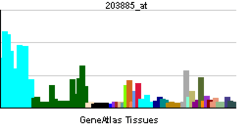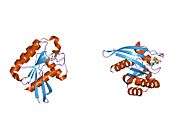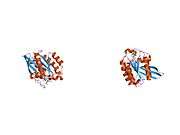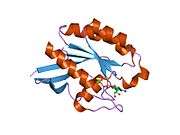RAB21
| View/Edit Human | View/Edit Mouse |
Ras-related protein Rab-21 is a protein that in humans is encoded by the RAB21 gene.[3][4][5][6]
References
- ↑ "Human PubMed Reference:".
- ↑ "Mouse PubMed Reference:".
- ↑ Opdam FJ, Kamps G, Croes H, van Bokhoven H, Ginsel LA, Fransen JA (Oct 2000). "Expression of Rab small GTPases in epithelial Caco-2 cells: Rab21 is an apically located GTP-binding protein in polarised intestinal epithelial cells". Eur J Cell Biol. 79 (5): 308–16. doi:10.1078/S0171-9335(04)70034-5. PMID 10887961.
- ↑ Pereira-Leal JB, Seabra MC (Nov 2001). "Evolution of the Rab family of small GTP-binding proteins". J Mol Biol. 313 (4): 889–901. doi:10.1006/jmbi.2001.5072. PMID 11697911.
- ↑ Pellinen T, Arjonen A, Vuoriluoto K, Kallio K, Fransen JA, Ivaska J (Jun 2006). "Small GTPase Rab21 regulates cell adhesion and controls endosomal traffic of beta1-integrins". J Cell Biol. 173 (5): 767–80. doi:10.1083/jcb.200509019. PMC 2063892
 . PMID 16754960.
. PMID 16754960. - ↑ "Entrez Gene: RAB21 RAB21, member RAS oncogene family".
Further reading
- Nagase T, Miyajima N, Tanaka A, et al. (1995). "Prediction of the coding sequences of unidentified human genes. III. The coding sequences of 40 new genes (KIAA0081-KIAA0120) deduced by analysis of cDNA clones from human cell line KG-1". DNA Res. 2 (1): 37–43. doi:10.1093/dnares/2.1.37. PMID 7788527.
- Bao S, Zhu J, Garvey WT (1999). "Cloning of Rab GTPases expressed in human skeletal muscle: studies in insulin-resistant subjects". Horm. Metab. Res. 30 (11): 656–62. doi:10.1055/s-2007-978953. PMID 9918381.
- Hartley JL, Temple GF, Brasch MA (2001). "DNA cloning using in vitro site-specific recombination". Genome Res. 10 (11): 1788–95. doi:10.1101/gr.143000. PMC 310948
 . PMID 11076863.
. PMID 11076863. - Simpson JC, Wellenreuther R, Poustka A, et al. (2001). "Systematic subcellular localization of novel proteins identified by large-scale cDNA sequencing". EMBO Rep. 1 (3): 287–92. doi:10.1093/embo-reports/kvd058. PMC 1083732
 . PMID 11256614.
. PMID 11256614. - Strausberg RL, Feingold EA, Grouse LH, et al. (2003). "Generation and initial analysis of more than 15,000 full-length human and mouse cDNA sequences". Proc. Natl. Acad. Sci. U.S.A. 99 (26): 16899–903. doi:10.1073/pnas.242603899. PMC 139241
 . PMID 12477932.
. PMID 12477932. - Gerhard DS, Wagner L, Feingold EA, et al. (2004). "The status, quality, and expansion of the NIH full-length cDNA project: the Mammalian Gene Collection (MGC)". Genome Res. 14 (10B): 2121–7. doi:10.1101/gr.2596504. PMC 528928
 . PMID 15489334.
. PMID 15489334. - Wiemann S, Arlt D, Huber W, et al. (2004). "From ORFeome to biology: a functional genomics pipeline". Genome Res. 14 (10B): 2136–44. doi:10.1101/gr.2576704. PMC 528930
 . PMID 15489336.
. PMID 15489336. - Mehrle A, Rosenfelder H, Schupp I, et al. (2006). "The LIFEdb database in 2006". Nucleic Acids Res. 34 (Database issue): D415–8. doi:10.1093/nar/gkj139. PMC 1347501
 . PMID 16381901.
. PMID 16381901.
This article is issued from Wikipedia - version of the 6/3/2016. The text is available under the Creative Commons Attribution/Share Alike but additional terms may apply for the media files.







